MercoPress. South Atlantic News Agency
Tag: pesticides
-
Friday, December 29th 2023 - 10:44 UTC
Lula enacts so-called “poison law” in Brazil

Brazilian President Luiz Inácio Lula da Silva Thursday signed into law the so-called “pesticides bill” easing down restrictions on the use of those chemicals, albeit with partial vetoes, it was reported in Brasilia.
-
Tuesday, November 8th 2022 - 09:34 UTC
Pesticides and heavy metals detected in Argentine river waters

According to a report from the National Institute of Agropecuarian Technology (INTA) and the national universities of San Martín (Unsam) and of the Litoral (UNL), a high number of biocides was detected in the Salado River basin in the province of Santa Fe.
-
Monday, October 18th 2021 - 09:23 UTC
Paraguay has 180 days to repair environmental damages, says UN
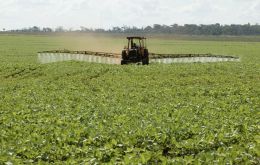
The United Nations Human Rights Committee has ruled in Geneva that indigenous people are affected by Paraguayan companies spreading pesticides in areas neighbouring homes, schools, roads and rivers thus affecting the water supply to indigenous peoples, causing “diarrhoea, vomiting, respiratory problems and headaches,” were entitled to reparations.
-
Tuesday, August 20th 2019 - 20:07 UTC
Brazilian bees decimated by pesticides which are banned in Europe

More than half a billion bees dropped dead in Brazil within just three months, according to Bloomberg. Researchers say the main cause of death is pesticides, which could end up affecting more than the bees.
-
Wednesday, August 7th 2019 - 09:58 UTC
Brazil's record on pesticides and weed killers could create problems for the Mercosur/EU trade agreement
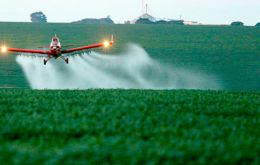
Brazil's agriculture minister on Tuesday defended a record number of pesticide and weedkiller approvals this year, saying the government was not “putting poison on anyone's plate.”
-
Monday, April 22nd 2019 - 09:11 UTC
What is Earth Day, and what is it meant to accomplish?

On April 22, 1970, millions of people took to the streets to protest the negative impacts of 150 years of industrial development.
-
Wednesday, July 31st 2013 - 05:54 UTC
FAO calls for withdrawal of highly hazardous pesticides in developing countries
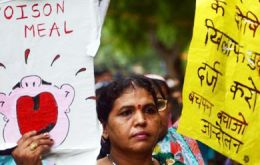
The tragic incident in Bihar, India, where 23 school children died after eating a school meal contaminated with monocrotophos, is an important reminder to speed up the withdrawal of highly hazardous pesticides from markets in developing countries, the UN Food and Agriculture Organization (FAO) said on Tuesday.
-
Tuesday, June 25th 2013 - 02:00 UTC
Lead case in Uruguay: Herbicide-spraying company forced to pay compensation for fumigating school

A Uruguayan rural school teacher who suffered the consequences of agro-toxics spraying from neighbouring soybean crops has won a civil court demand against the fumigation company. The court ruled that Agronegocios del Plata, ADP, must compensate Silvia Nobelasco the equivalent to 6.800 dollars.
-
Thursday, June 14th 2012 - 10:49 UTC
Shell drops plan to buy sugar cane grown on land taken from indigenous people
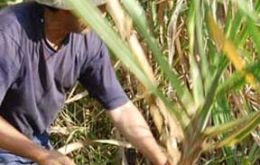
Shell subsidiary that makes bio-diesel in Brazil has dropped controversial plans to buy sugar cane grown on land taken from indigenous people, according to Survival International.
-
Friday, January 13th 2012 - 21:02 UTC
Trade of illegal pesticides booming in Europe under control of organized crime
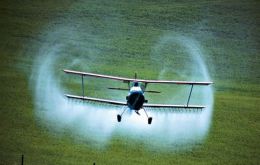
The trade of illegal and counterfeit pesticides is proliferating in Europe reports Europol. The exceptional ‘low risk – high profit’ margin, combined with the lack of harmonisation in legislation and implementation, make this a fast growing area of organised crime.
